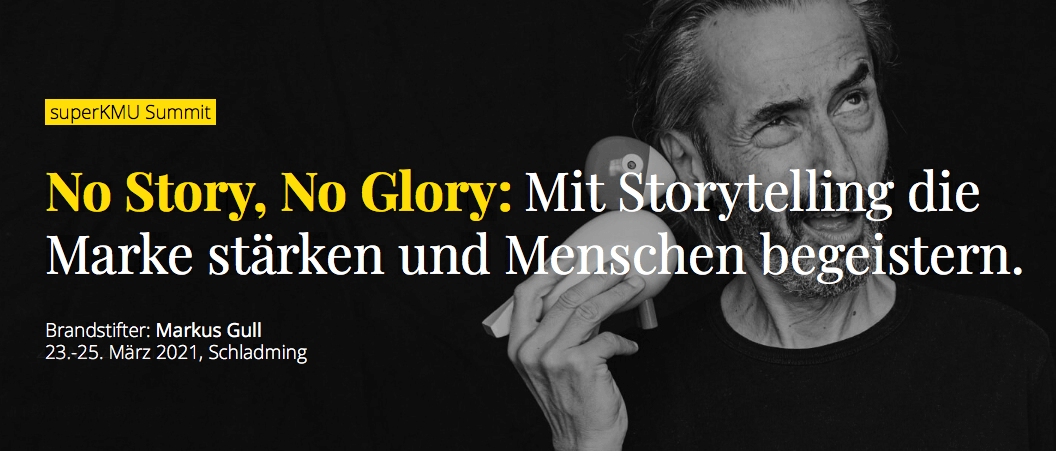The new year is now so old that the first people are already starting to look forward to the next one. For the new year has done one thing that its numerous predecessors did: it did not change everything from one day to the next. The consolation of the autumn announcement "2020 is over, 2021 the game begins anew" naturally carried the seeds of disappointment.
At least Donald Trump's contributions to everyday noise are out for now. She replaced the gap they left without a hitch.
What else is coming? - In response, I'm putting the Goldman disclaimer at the beginning of this year, which I always put at the beginning of my workshops and lectures. And the Goldman disclaimer will definitely also be at the beginning of my book, which I am currently pressing out of my heart.
What?!? You don't know the Goldman disclaimer? - An unmistakable sign that you should attend one of my workshops. The next public opportunity is on 18 May, here.
TOO LAZY TO READ ON? THEN LISTEN TO ME:
In the blogcast, I read this recent blog article to you. With emphasis, of course!
I named the Goldman disclaimer after the legendary author William Goldman. You are probably familiar with his work in Hollywood. He won Oscars® for the scripts "Butch Cassidy and the Sundance Kid" and "All the President's Men", he also wrote the screenplays for "Misery", "Marathon Man" or "A few good Men", among others. His story "The Princess Bride" is a special pearl for many.
Bill Goldman would have 90 candles to blow out on his birthday cake this year if he were still on earth. While he was still alive, he wrote his memoirs. In the first volume, "Adventures in the Screen Trade", he stated: "Nobody knows anything. Not one person in the entire motion picture field knows for a certainty what's going to work. Every time out it's a guess - and, if you're lucky, an educated one." - Nobody knows anything: the Goldman disclaimer.
How else can it be explained that, according to the setup, perfect projects ultimately go completely to shit?
Have you seen the latest film version of "Dr. Dolittle"? Or "Cats"? Both films were made under optimal conditions - created by terrific leading teams with huge budgets and with first-class actors. Yet: media and fans have torn the projects to shreds.
After seeing the last "James Bond", I tried in vain to get my two hours back at the box office.
In a review of "Dirty Grandpa" with Robert De Niro and Zac Efron I read: "... this is the worst film De Niro has ever been in. Or rather, it's the worst film in which anyone has ever acted ...".
Hollywood and the surrounding area.
Since we can assume that those involved haven't forgotten their job since their last masterpieces, there's only one answer to the question "How could this happen?": "Nobody knows anything.
I don't disagree, but extend that statement beyond the borders of Hollywood. No one knows how to do it. Not even me.
What's more, among all the wrong turns I always talk about, there is hardly one that I would not have taken myself, personally and at a stretched gallop, sometimes even against my better judgement. If Homer were working in the film industry today, he would offer my odyssey as a screenplay. As a sequel to "The Rich Man" under the opposite sign: "He didn't know anything, except how to get lost" would be a first suggestion for the working title and perhaps something for Netflix.
Particularly in these times when almost everything is changing, we should react with ostentatious caution to all those who claim to know the only right way. These are usually the same people who, when we make a mistake on one of these paths, are on hand with a "We didn't do anything wrong!" and with the same finger with which they showed us the right way, now point at those who are guilty of the error. This "knowing how to do it" narrative in the equivalent of a G'schicht'l, as it is called in Austrian, runs down like honey, but at the end of its indigestibility it burns like a chilli con carne from the devil's casserole. Not enough, sit down, but here's to something soft!
The non-falsifiers know above all the shortest way between a cool head, cold blood and a hard heart that cannot be softened even with phrases. They have long since left the short path behind them. On the fringes there - we can currently observe it - refugee children lie in their misery, a bit nibbled on by rats, while according to the narrative they are helped on the spot. Others are deported to theirs, no matter what the cost, because this short route is taken in a legally compliant and dashing manner. If education and the formation of the heart have not found a place in the marching baggage, details such as "humanitarian right to stay" are sometimes overlooked. However, it is all the more obvious that the heart and the pit of murder are sometimes more similar than one would like to think; style and style, on the other hand, are something completely different.
We know the know-it-alls - the older ones among us will remember - as prophesying haruspices who got their information mainly from the entrails of their sacrificial animals. This method has been optimised for use today in that the sacrificial animals of the officiating augurs are usually the same critters that make up their audience. A meta-mutation of herd immunity, so to speak. Or, to paraphrase Kurt Tucholsky: "Never underestimate the power of stupid people who are of one mind!"
Nobody knows anything.
Socrates and our inner story.
Probably we are well advised to remember Socrates: "οἶδα οὐδὲν εἰδώς (oîda oudén eidōs)." A phrase that even the younger among us remember vividly as "I know that I know nothing". The very young among us probably delight in the first word "oîda" of the ancient Greek quotation, which in its timeless beauty made it into Viennese everyday language and several times into court.
A coincidence? What do I know ...?
Nobody knows anything.
Basically, it's about the stories we tell ourselves over and over again, the stories that make up our inner story. It is made up of all kinds of things that we hear, read, see, that we are told, and of what we make up and rhyme together. This is how we learn about the world, about our world.
For many, it is enough to post what they learn on Facebook . Others feel great insta-joy over a distorted picture as a share picture. Still others are more comfortable if they can feel offended by something on Twitter in order to inflate their bubble by insulting the respective offenders back. One might call this the Tucholsky algorithm, or the doubling effect.
Everyone inside and outside social media would do well to let more social and less media into their lives. It helps to make understanding, not answers, the goal of listening. Some call it humility. It's a big word, but it's accurate.
What if we are wrong?
It is said that the more strongly a person's preconceived ideas are attacked, the more fiercely he defends them. At least that's what I read - maybe even on Facebook. Anyone who has heard Donald Trump's farewell statement knows what is meant.
Somewhere else I read that Barack Obama surprised his staff at the end of his term with an elegant question: "What if we were wrong?" This was reported by Ben Rhodes, top adviser to President Obama in "The world as it is: a memoire of the Obama White House". A good scene that explains the character as if William Goldman had thought it up, and a good story about history.
If ever a country was built on a story, it is surely the USA. On two stories, to be precise. Ben Rhodes told us in Berlin almost exactly two years ago which two American stories they are.
Good stories - especially one's own, the inner, the nourishing one - usually begin with a question, or even with a questioning of known points of view. This is how we can grow from the inside out, just as trees do. Good conversations help, and from that point of view Clubhouse could well be a promising offer. Or maybe just hype and much ado about nothing?
Welcome to the Club House.
I recently listened to some experts talk about Brands & Purpose for half an hour on Clubhouse. The people on the panel knew nothing about the Goldman disclaimer and not that much about Brands & Purpose, but they still talked about it in front of a good audience. Afterwards, I cried myself to sleep.
Purpose is also a hellish word like storytelling, sustainability, the why, mindfulness and the like. Although, beyond the bloated empty words, Purpose would be real power food for every enterprise - for companies, teams, NGOs and all personal projects.
Hannes Offenbacher, the witty and wobbly helmsman of Schumbetaand I are giving Clubhouse a try. Also joining us are the fantastic Julia Culen, founder of the Conscious Consulting Group, and the great Thomas Weber, publisher of Biorama. We'd love you to join us too, on Thursday 4 February from 19:00 to 20:00 at the Schumbeta Clubhouse talk on "Brand Purpose: Green Washing or Turbo for Innovation?"
We ask ourselves there, among other things: Do all companies really have to create meaning so that they will still be successful tomorrow? And: Will there soon be a Chief Purpose Officer, or is purpose automatically a matter for the boss?
Here is your all-access wristband to our Clubhouse.which will grant you entry if you have an iPhone and a Clubhouse account. Bring your friends & family, please share the link.
New year. New story.
Corona coughed up all kinds of things from the calendar. The Schumbeta Summit"No Story, No Glory: Strengthening the brand and inspiring people with storytelling". for example. This summit, which I am allowed to accompany in an inspiring way in my favourite role as a brand-, anchor- and troublemaker, has meanwhile landed in March. So something positive this year after all, and a new "Asterix" is coming in autumn! You can't pre-order it yet, but you should register for the Schumbeta Summit right here. I'm confident that the event will actually take place, hygiene-secured in the soft tissue of infection. At its beginning, Bill Goldman will naturally step into his rights.
"Nobody knows anything." - If we always keep this sentence switched on in the back of our hearts, we will all do easier with each other in our completely overheated world. Because that's what it is - in the world climate as well as in the climate of conversation.
There are always stories there that we tell - to ourselves and to each other. "Everything we hear is an opinion, not a fact. Everything we see is a perspective, not a truth," Marcus Aurelius told us, and it is always our perspectives, our stories, our values. Every grandiose superhero simultaneously emerges as the ultimate villain in his adversary's story.
If every person, every company, every one of us at least thought the Goldman disclaimer and the Obama question were possible, then the door to a new history would already be a bit wide open for all of us, wouldn't it? A leap wide, through which a bit of a different light comes in.
In this light, we could send positive signals to everyone else, give confidence impulses and support everyone else to do the same. This might even result in a tomorrow that has the makings of a new, a better story for all of us, one that is about all of us and multiplies our strengths instead of dividing us like the old story.
When we do this for each other, we do it for ourselves at the same time. Then we meet each other beyond right and wrong, to borrow from Rumi.
And I think that 's what my grandmother meant, old Story Dudette, who knew she knew nothing, but was still unbendingly sure of one thing: "No Story. No Glory."






